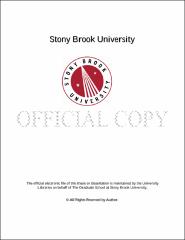‘My Kind of Partisan’ – The Role of Party Leaders in Shaping Party Attachments
‘My Kind of Partisan’ – The Role of Party Leaders in Shaping Party Attachments
| dc.identifier.uri | http://hdl.handle.net/11401/76754 | |
| dc.description.sponsorship | This work is sponsored by the Stony Brook University Graduate School in compliance with the requirements for completion of degree. | en_US |
| dc.format | Monograph | |
| dc.format.medium | Electronic Resource | en_US |
| dc.language.iso | en_US | |
| dc.publisher | The Graduate School, Stony Brook University: Stony Brook, NY. | |
| dc.type | Dissertation | |
| dcterms.abstract | Hardly any political scientist would disagree that partisanship is a key variable in political behavior research: It predicts vote choice, political attitudes and core values as well as party leader evaluations and political activism. We observe these effects especially among strong partisans – a segment of the American electorate that has notably increased in recent years. While the consequences of strong partisanship for political behavior are well-known, we still lack a theoretical framework as well as corresponding empirical evidence that explains why some partisans are deeply attached to their party whereas others lack that type of strong commitment. I address these gaps in three different ways: First, I develop a social identity-based theory of partisan strength in which I argue that partisans’ overlap with the party prototype shapes the intensity of their party attachments. These party prototypes exemplify the political and social attributes of party members that we perceive as typical. Party leaders are particularly influential in shaping our perception of what these attributes are, enabling partisans to estimate how well they fit in with the party. This judgement of similarity with the party prototype can ultimately lead to stronger party identification. Therefore, I predict that similarity to inparty leaders increases partisan identity strength. Second, to reflect the identity-based conceptualization of partisan strength, I introduce a multi-item partisan identity scale that captures fine gradations in the intensity of party attachments better than the traditional strength measure. The scale’s superior measurement properties allow researchers to measure partisan strength as a continuous variable and to detect even subtle treatment effects in experimental studies in which the strength of partisanship is the dependent variable. Third, I test my theory with two experiments and find supportive evidence for the claim that similarity to the party prototype increases partisan identity strength whereby even similarity that is void of political content can strengthen party ties. These findings underline the social nature of political parties and partisans’ desire to be representative of their party even with regard to attributes that are ostensibly irrelevant to politics. | |
| dcterms.abstract | Hardly any political scientist would disagree that partisanship is a key variable in political behavior research: It predicts vote choice, political attitudes and core values as well as party leader evaluations and political activism. We observe these effects especially among strong partisans – a segment of the American electorate that has notably increased in recent years. While the consequences of strong partisanship for political behavior are well-known, we still lack a theoretical framework as well as corresponding empirical evidence that explains why some partisans are deeply attached to their party whereas others lack that type of strong commitment. I address these gaps in three different ways: First, I develop a social identity-based theory of partisan strength in which I argue that partisans’ overlap with the party prototype shapes the intensity of their party attachments. These party prototypes exemplify the political and social attributes of party members that we perceive as typical. Party leaders are particularly influential in shaping our perception of what these attributes are, enabling partisans to estimate how well they fit in with the party. This judgement of similarity with the party prototype can ultimately lead to stronger party identification. Therefore, I predict that similarity to inparty leaders increases partisan identity strength. Second, to reflect the identity-based conceptualization of partisan strength, I introduce a multi-item partisan identity scale that captures fine gradations in the intensity of party attachments better than the traditional strength measure. The scale’s superior measurement properties allow researchers to measure partisan strength as a continuous variable and to detect even subtle treatment effects in experimental studies in which the strength of partisanship is the dependent variable. Third, I test my theory with two experiments and find supportive evidence for the claim that similarity to the party prototype increases partisan identity strength whereby even similarity that is void of political content can strengthen party ties. These findings underline the social nature of political parties and partisans’ desire to be representative of their party even with regard to attributes that are ostensibly irrelevant to politics. | |
| dcterms.available | 2017-09-20T16:51:07Z | |
| dcterms.contributor | Feldman, Stanley | en_US |
| dcterms.contributor | Lebo, Matthew | en_US |
| dcterms.contributor | Huddy, Leonie | en_US |
| dcterms.contributor | Egan, Patrick. | en_US |
| dcterms.creator | Bankert, Alexa | |
| dcterms.dateAccepted | 2017-09-20T16:51:07Z | |
| dcterms.dateSubmitted | 2017-09-20T16:51:07Z | |
| dcterms.description | Department of Political Science | en_US |
| dcterms.extent | 278 pg. | en_US |
| dcterms.format | Monograph | |
| dcterms.format | Application/PDF | en_US |
| dcterms.identifier | http://hdl.handle.net/11401/76754 | |
| dcterms.issued | 2016-12-01 | |
| dcterms.language | en_US | |
| dcterms.provenance | Made available in DSpace on 2017-09-20T16:51:07Z (GMT). No. of bitstreams: 1 Bankert_grad.sunysb_0771E_12856.pdf: 3033130 bytes, checksum: c6ce8371f40556c5efcf23b31e9a3892 (MD5) Previous issue date: 1 | en |
| dcterms.publisher | The Graduate School, Stony Brook University: Stony Brook, NY. | |
| dcterms.subject | Political science -- Psychology | |
| dcterms.title | ‘My Kind of Partisan’ – The Role of Party Leaders in Shaping Party Attachments | |
| dcterms.title | ‘My Kind of Partisan’ – The Role of Party Leaders in Shaping Party Attachments | |
| dcterms.type | Dissertation |

